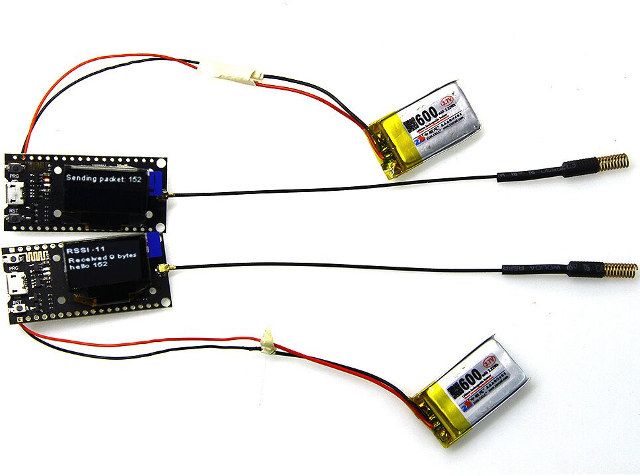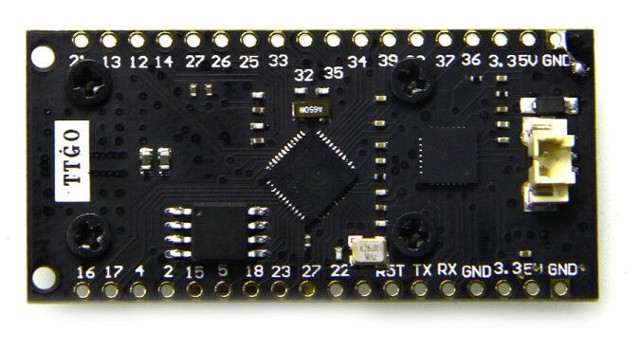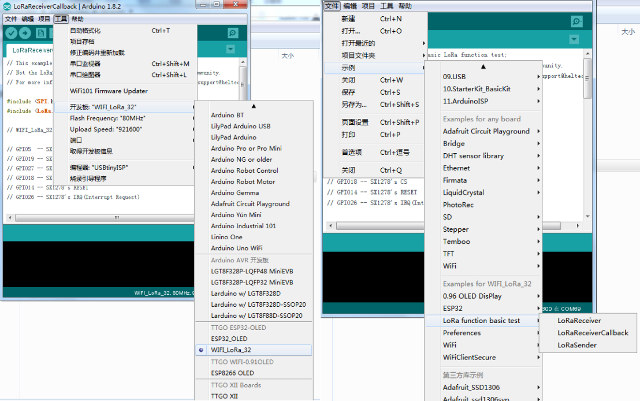Just one year ago, it would cost around $15 to $20+ to get an ESP32 board, that is if you were lucky/fast enough to order one one before it went out of stock. Since then, availability is no longer an issue, and you now can get an ESP32 development board for as low as about $7, or even around $4 during promotions.
Today, I was made aware of another board sold under the “TTGO” brand, that includes not only ESP32 WiFi and Bluetooth SoC, but also a (433 MHz) LoRa radio, and an OLED display. Price? Just $10 plus shipping ($1.75 here).

TTGO ESP32/LoRa board specifications:
- WiSoC – Espressif ESP32
- Storage – 32MB on-board flash (or maybe just 16MB?)
- LoRa
- Semtech SX1278 with u.FL connector + 433MHz antenna (N.B.: Antenna must be connected during use or the Semtech chip could be damaged)
- Sensitivity” ~ -148dBm; output power: +20dBm
- Display – 0.96″ blue OLED display
- USB – 1x micro USB port for debugging (CP2102) and power
- Expansion – 2x 18-pin headers with GPIOs, UART, ADC, Touch, SPI, power signals… (See pinout diagram)
- Misc – Charging Status LED
- Power Supply – 5V via micro USB port, 2-pin battery header, 5V Pin. (Operating voltage: 3.3V to 7V)
 The board can be programmed with the Arduino IDE after downloading and installing the TTGO folder in arduino/hardware. After selecting “WiFi_LoRa_32” board, you should be able to load various samples to play with the board.
The board can be programmed with the Arduino IDE after downloading and installing the TTGO folder in arduino/hardware. After selecting “WiFi_LoRa_32” board, you should be able to load various samples to play with the board.

The board is sold with a 433MHz antenna, and two male headers. You’ll save a little bit on shipping if you purchase two kits instead. The board can also be found on eBay and Banggood.
Thanks to Mpampis for the tip.

Jean-Luc started CNX Software in 2010 as a part-time endeavor, before quitting his job as a software engineering manager, and starting to write daily news, and reviews full time later in 2011.
Support CNX Software! Donate via cryptocurrencies, become a Patron on Patreon, or purchase goods on Amazon or Aliexpress





Nice esp32 LORA board!
Looklike an improvement of LOLIN board… cheaper well done chineses!
Hope the battery management is good…
Re flash storage: it’s not 32MB, it’s 32Mb (megabits) = 4MB (megabyte). Same as most other ESP32 boards.
What can you with the “LoRa Semtech SX1278”? Is that peer-2-peer communication, or can you talk a public LoRa provider?
@Jan de Boer
I’m very confused about that. In the description they write “32MBytes”, but in the title “16 Mt Bytes (128 Mt bit)”. So I assume it was either 16MB or 32MB flash. Or is it not supported by ESP32? Or not possible for that price?
If we had a clear photo of the SPI flash used it would be clearer.
It is nice board. Looking for 868Mhz version foe Europe. Still not clear for me the memory size and the battery since esp32 consume more battery then esp8266.
@Jean-Luc Aufranc (CNXSoft)
Assuming flash is SOIC-8-200 chip on the back side, this is likely 25Qxx, which in theory be up to 128mbit part (positively not 256mbit, those don’t exist in this package). But at ~ $1/piece, I seriously doubt a low-cost board would go with 25Q128. One step down, 25Q64 are not very common, and not particularly attractive price/MB-wize. Which leaves 25Q32 as most likely.
@Catalin
ESP32 has ULP (ultra-low-power) processor core, which consumes microampers, but is smart enough to handle simple bit-banged protocols all by itself (see [1] for example). Which means that during long LoRa transaction, main CPU could be completely powered down, and only wake after that, and not being tied to slow protocol, very quickly go back to sleep. So I would expect a well-designed ESP32-LoRa combination to be much more power-efficient than ESP8266-LoRa.
[1] https://github.com/tomtor/ulp-i2c
Thanks for clarifying this. I need to read more about ULP on ESP32.
Uses the dreaded 26mhz Crystal and 2.4ghz rf layout is not great. When will they make a 868/915mhz version?
Other brands on https://www.aliexpress.com/store/product/SX1278-ESP32-LoRa-0-96-Inch-Blue-OLED-Display-Bluetooth-WIFI-Lora-Kit-32-Module-IOT/606998_32825749403.html?spm=2114.12010108.0.0.ea2652buKOPGG
If only 1 band available, 433MHz seems an odd choice. In the locations I am interested, the public gateway providers only work with 868/915 MHz
Does it allow for recharging a backup LiPo? (looking at the white connector on reverse side)
@Deets
“dreaded 26Mhz” crystal you mean this? https://www.esp32.com/viewtopic.php?t=2742#p13328 It seems like it’s fixed in software. was there something else you meant?
Electrodragon has something similar @ http://www.electrodragon.com/product/wifi-lora-32-dev-board/
Can someone give me a link where I can download the “TTGO folder”? It seems almost impossible to create an account with Baidu since they ask for a phone number verification. If someone is kind enough to download this folder and share it in any sharing sites (or dropbox or google drive), it is helpful to all. Hope someone does.
@Praveen
You don’t need an account for Baidu download.Don’t click on the big button in the middle, but instead of the download icon (下载) somewhere on the top.
Thanks. It did not work on the desktop as the (下载) took me to login page. However, when tried on the mobile, it worked. Now I have the folder and will start working on it. Thanks again.
Please could you share <just like you requested earlier) the download folder with Google Drive link or dropbox? I believe this would save a great deal of time for others with same challenge. Thanks in advance
Some code resources with demos are available there: https://github.com/osresearch/esp32-ttgo
I am also confused about Lora. Is it possible to build a 20 node private network out of Lora without a $50 gateway chip in the center of the network? Lets say I wanted to send data from 20 temperature sensors back to a RaspPi. Does the RaspPi have to have a Lora gateway chip?
It can be done with own Lora MAC layer. I’ve implemented such – the RPi with lora hat has the gateway/app server build as one app with custom Murata STM32 Lora chip fw.
@Jon Smirl nope, you need a lora gateway/basestation, either your own or a commercial one. it’s an overhyped scam.
Can someone tell me for what TTGO stands for.
TTGO is just a product family from LilyGo company. It may not stand for anything at all.
Somewhere i found it stands for time to go online, but not sure. Thanks anyway.
Note the pin out diagram linked about has the pins shown on the wrong side. i.e. The ones on the left of the diagram are actually on the right and vice versa. The order of the pins seems correct though.